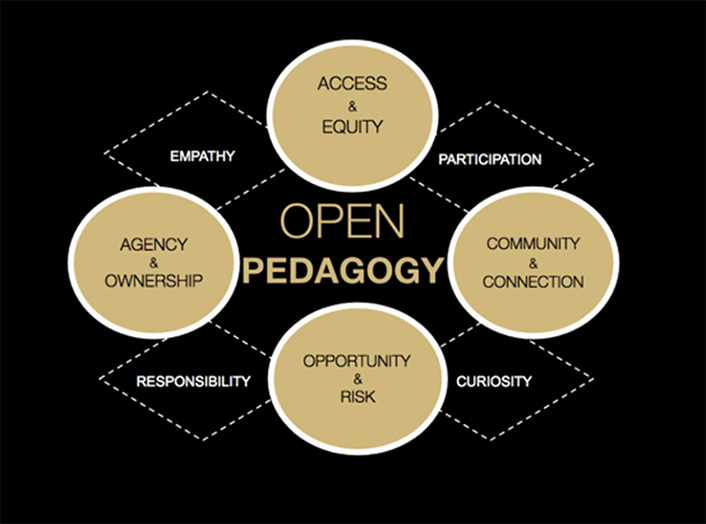New article out in EDUCAUSE Review that outlines a possible open pedagogy framework. Here’s the key graphic:

As long-time readers of this blog know, I may be the misinformation literacy person right now, but I came here by way of thinking about open pedagogy and its intersection with digital literacy and democracy. It’s literally my 20 year passion in this space, what excited me about edtech back in 1996 and got me on this road.
The one thing I like about the language above is that it’s possible to start to tease out the tensions of open pedagogy from the model. And it’s the tensions that you have to start with, otherwise you just get religion.
As an example, Maha Bali has noted that access and equity often are in tension with agency and ownership. Self-hosted publishing systems, for example, which provide strong levels of ownership and agency, often throw up technical and economic barriers for students. There is a tension there that never resolves, but has to be seen as a set of competing ideals, reconcilable only in the scope of a given local context.
You find similar tension between agency and community. Long ago, when we did Keene State’s media fluency outcomes, we separated out participatory modes (about personal engagement and empowerment) and collaborative modes (about working together). And there is a tension there — to act collectively is to give up some power and ownership for the sake of connection and communal action. Things like federation provide new (and exciting!) ways of dealing with these concerns, but do not eliminate the need for trade-offs.
Even Community and Equity can be at loggerheads. When we have students engage in real-world environments like Wikipedia, we are giving them ability to have real impact, but it can come at the cost of putting them into environments that are not equitable.
In terms exploring tensions, risk and responsibility — defined as a commitment to interrogate tools and practices — is the one that doesn’t quite fit for me — to me this is a broader element that actually touches on these other realms — Agency, Community, Equity — because these tensions are exactly what a interrogation of tools should look at. So I see this as more of a meta orientation, connecting the others. If I were to choose a fourth to replace it, I might look at impact — the way in which students are given opportunities to make non-pedagogical impacts on things that matter to them, and then have interrogation cut across all the dimensions.
Overall, though, very happy to see this and hope we keep talking about it.
Leave a comment